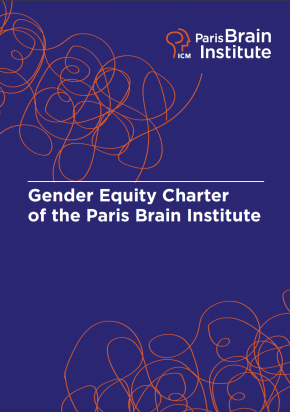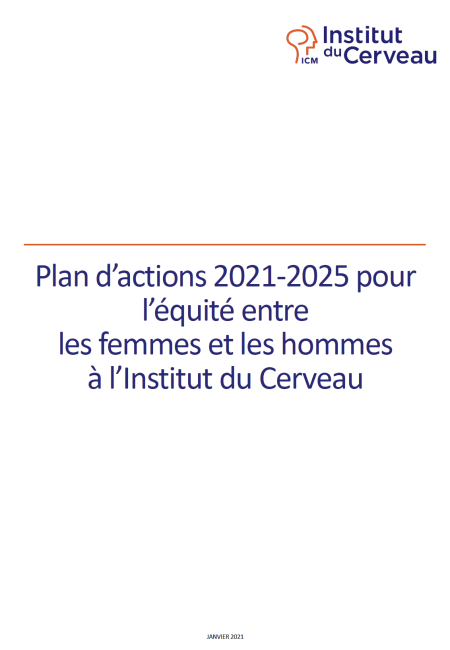Integrity, transparency and accountability with regard to the major issues facing our societies have always been at the heart of the values of Paris Brain Institute. These concerns have led it to make voluntary commitments, particularly in the areas of ethics and deontology, equity and inclusion, and rigour and quality in its management of donations.
Ethics and professional conduct
Published in 2020, the Ethical Charter of Paris Brain Institute was designed to cover the Foundation’s mission of promoting honest and responsible research in the service of the advancement of knowledge, with a view to improving the quality of life of individuals and communities.
The Charter sets out a number of agreed ethical and professional standards, the application of which is essential in the Institute’s fields of activity. It also serves as a reminder of the basis for professional integrity in general.
The Charter of Ethics and Conduct embodies the 12 commitments made by those who contribute to the work of the Institute, regardless of their profession.

The Code of Ethics sets out the 12 commitments made by all those who contribute to the Institute's activities, whatever their profession.
Equity and inclusion
The professional environment promoted by the Brain Institute is based on diversity and respect for the individual regardless of nationality, origin, gender, age, disability, etc.
ALBA Declaration
In January 2021, the Paris Brain Institute signed the ALBA Declaration on Equity and Inclusiveness, in support of equity and inclusiveness in neuroscience.
By signing this declaration, Paris Brain Institute is now part of a network of more than 150 scientific organizations committed to greater diversity and equity in science.
ALBA brings together neuroscientists from around the world with the goal of developing equitable and inclusive scientific communities. It focuses on two barriers to equity and inclusiveness: implicit bias and a discriminatory workplace culture.
Charter for Equity between Women and Men
Paris Brain Institute reinforces its HR policy in favour of more equality between women and men with concrete actions including the establishment, since 2018, of an advisory committee to the Directorate for Equity: the Gender Equity Committee.
In line with the Charter on Ethics and Ethics, in January 2022 the Brain Institute adopted a Charter on Gender Equality. It lays down the principles and objectives to be achieved within the Institute in order to combat gender discrimination and to promote equity. This Charter is the first pillar of an approach that more broadly fights other sources of discrimination and inequity, and promotes inclusiveness and diversity within the Brain Institute. A five-year action plan also provides the means and resources that the Institute will use to achieve the objectives set out in the Charter.

Gender Equity Charter of the Paris Brain Institute
The Gender Equity Charter was drafted by the Gender Equity Committee. It sets out the principles and objectives to be achieved within the Institute in order to combat gender discrimination and promote equity, and proposes the means to achieve this.

A five-year action plan also sets out the means and resources that the Institute will deploy to achieve the objectives set out in the Gender Equality Charter.
Index of occupational equality between women and men
The regulations (law of 5 September 2018 on the freedom to choose one’s professional future) aimed at reducing inequalities between men and women include several obligations which are now binding on the employer.
One of these is the calculation of several indicators (5), called the Gender Equality Index. The five indicators relate to the pay gap between women and men, the individual increase rate gap, the promotion rate gap between women and men, the percentage of female employees who received an increase in the year of their return from maternity leave, the number of employees of the under-represented sex among the ten highest paid employees.
Calculation of this index results in an overall score out of 100. If the score is less than 75 points out of 100, the company must take steps to correct the situation within three years or face a financial penalty.
Enterprises with more than 250 employees (the situation of Paris Brain Institute) are subject to this obligation from 1 September 2019.
The overall rating for the Paris Brain Institute for the year 2025 is 99/100, broken down by indicators as follows:
- Indicator pay gap: 39
- Indicator rate of increase variance: 20
- Promotion Rate Deviation Indicator: 15
- Indicator return of maternity leave: 15
- High Pay Indicator: 10
Paris Brain Institute is pursuing its HR policy in favour of more equality between women and men with concrete actions in this direction, including the establishment, since 2018, of an advisory committee to the Directorate for Gender Equity "Comité équité femmes-hommes".

Data Governance Policy
Paris Brain Institute publishes its data governance policy. The objectives of this initiative are to ensure the integrity of research, respect the values of open science and value research discoveries.
Paris Brain Institute Data Policy
Transparency and ethics in fund-raising
In 2020, Paris Brain Institute has adopted an ethics and deontology charter. One of the 12 commitments in the charter is to use the generosity of the public, including transparency and integrity in the management of its donations. In addition to its internal controls, the Institute’s management activity is subject to a number of auditing procedures issued by the auditors and the public authorities.
The accounts of Paris Brain Institute are made public annually and communicated to donors in a quarterly issue of their newsletter. They are available on the Internet and widely disseminated.
Committed to maintaining excellence, Paris Brain Institute has put in place internal and external control procedures to ensure the rigour, efficiency and transparency of its donation management.
In addition, the Institut du Cerveau has been awarded the “Don en Confiance” label since 3 November 2010, renewed on 22 October 2022. The Don en Confiance association has been monitoring associations/foundations for more than 30 years, calling on the generosity of the public. The Don en Confiance label is based on the four main principles of its Charter of Ethics: respect for the donor, transparency, the search for efficiency and probity and disinterest.

Particularly committed to maintaining excellence, Paris Brain Institute has put in place internal and external control procedures to ensure the rigour and effectiveness of its management: membership of the Committee on the Charter of Giving with Trust and the call for an independent auditor.
Learn more about donation managementUse of animals for scientific purposes
The use of animal models for research purposes, particularly in the biomedical field, is the subject of much legitimate public questioning.
To combat diseases of the nervous system, the teams at Paris Brain Institute use all available methods, from computational models to human studies and animal models. With respect to compliance with regulations, the quality of research in its laboratories and its proactive approach to advancing research practices, Paris Brain Institute is committed to transparency and communication about its work and objectives.







